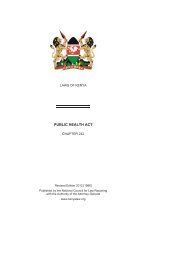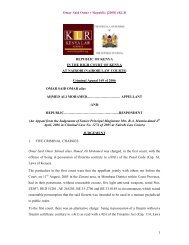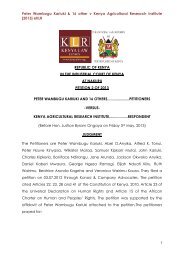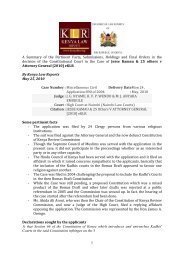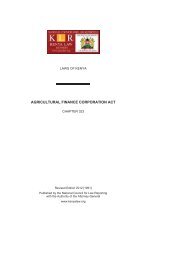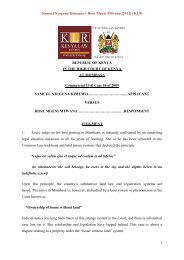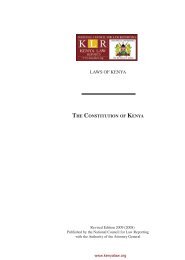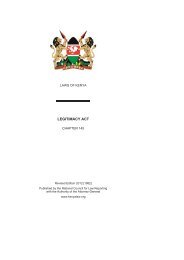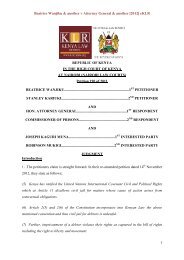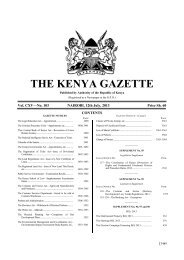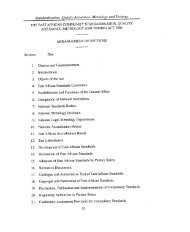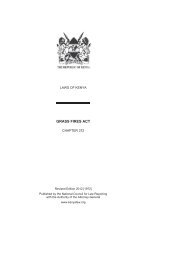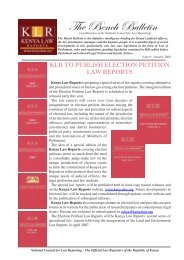Mwangi Stephen Mureithi v Daniel Toroitich Arap Moi - Kenya Law ...
Mwangi Stephen Mureithi v Daniel Toroitich Arap Moi - Kenya Law ...
Mwangi Stephen Mureithi v Daniel Toroitich Arap Moi - Kenya Law ...
You also want an ePaper? Increase the reach of your titles
YUMPU automatically turns print PDFs into web optimized ePapers that Google loves.
<strong>Mwangi</strong> <strong>Stephen</strong> <strong>Mureithi</strong> v <strong>Daniel</strong> <strong>Toroitich</strong> <strong>Arap</strong> <strong>Moi</strong> [2011] eKLRREPUBLIC OF KENYAIN THE HIGH COURT OF KENYA AT NAIROBICONSTITUTIONAL AND JUDICIAL REVIEW DIVISIONPETITION NO. 625 OF 2009IN THE MATTER OF: ALLEGED CONTRAVENTION OF FUNDAMENTALRIGHTS AND FREEDOMS OF THE INDIVIDUAL HIGH COURT PRACTICERULES AND PROCEDURES 2006.IN THE MATTER OF:SECTIONS 72, 75 AND 84(1) OF THE CONSTITUTIONOF KENYA (REPEALED)BETWEENMWANGI STEPHEN MUREITHI .......................................................PETITIONERANDHON. DANIEL TOROITICH ARAP MOI E.G.H.,.............................RESPONDENTRAYMARK LIMITED ............................................................INTERESTED PARTYJUDGMENTThis Petition was filed by MWANGI STEPHEN MURIITHI on 23/10/2009. He pleadssections 72, 75 and 84(1) of the Constitution of <strong>Kenya</strong> (now repealed), which I shall for thepurposes of this Petition and for ease of reference refer to as ‘the Constitution’. The saidconstitution was repealed upon the promulgation of the new Constitution of <strong>Kenya</strong> on27/8/2010.In his petition MWANGI STEPHEN MURIITHI (‘the petitioner’) states that HON.DANIEL TOROITICH ARAP MOI E.G.H., (who was at all material times, the Presidentof the Republic of <strong>Kenya</strong>, and who I shall henceforth refer to as ‘the respondent’) was hisbusiness partner and that they owned shares in three companies and several properties whosedetails appear here below:1
<strong>Mwangi</strong> <strong>Stephen</strong> <strong>Mureithi</strong> v <strong>Daniel</strong> <strong>Toroitich</strong> <strong>Arap</strong> <strong>Moi</strong> [2011] eKLR· Fourways Investments Limited, in which the petitioner held 40% while the respondentheld 19% of the shares, with the balance being held by two other shareholders, was theregistered proprietor of the properties situate in the city of Nairobi and more specificallyknown as L.R. No.209/4383 (situate along Muindi Mbingu Street), L.R. 209/2464 (situatealong Kimathi Street) and L.R. No. 209/2385 (situate along <strong>Moi</strong> Avenue). On these parcelswere situate buildings known as Ruprani, Kenwood and Atlas.· Sheraton Holdings Limited, in which the petitioner held 40% while the respondent held19% of the shares, with the balance being held by two other shareholders, was the registeredproprietor of the property known as L.R. No. 209/1846 situate along Mama Ngina Drive inNairobi on which stood Corner House.· Mokamu Limited, in which company, they each held 33% of the shares, with a thirdparty holding a further 33%, and which company was the registered proprietor of the farmproperty known as L.R. No. 11793 situate in Solai Nakuru District within the Republic of<strong>Kenya</strong>, measuring approximately 1020 acres.I shall refer to the three companies as ‘the companies’ and to the land and buildings as the‘subject properties’.The petitioner claims that sometimes in the year 1982, the respondent while using his powersas the President of the Republic of <strong>Kenya</strong>, without any lawful cause and excuse, ordered andcaused his detention without trial for the purpose of illegally and unconstitutionally deprivingthe petitioner of his rights to the said companies and the subject properties. He thus avers thatthe reasons for his detention were personal to the respondent and meant to achieve ulteriorcommercial advantages for the respondent and that in detaining him without trial, therespondent acted in abuse of office as President of the Republic of <strong>Kenya</strong>; that it was duringthe time of his detention and thereafter, that the respondent caused to be sold and ravaged hisinterests in the aforementioned companies and the subject properties without accounting forthe same to him; that he has refused and continues to refuse to give the petitioner an accountof his dealings in the said companies and the subject properties; that he has prevented himfrom accessing any information whenever he sought an account, and that a result of the2
<strong>Mwangi</strong> <strong>Stephen</strong> <strong>Mureithi</strong> v <strong>Daniel</strong> <strong>Toroitich</strong> <strong>Arap</strong> <strong>Moi</strong> [2011] eKLRaforesaid acts he has not only suffered loss, but that the respondent has trampled upon hisfundamental rights as enshrined in sections 72 and 75 of the Constitution.This petition thus comprises of various paragraphs and is supported by the petitioner’saffidavit. The petitioner, who was represented by Mr. Paul <strong>Mwangi</strong>, also filed submissions on11/5/2010. He feels that the aforementioned acts and the consequences arising there fromnegate his Constitutional rights and values as enshrined in Chapter V of the Constitutionunder which he is entitled to protection. He therefore prays for the following declarations:· That his detention was caused by the respondent for the achievement of ulteriorcommercial advantages for the respondent and was illegal and unconstitutional andcontravened his rights under Section 72 of the Constitution.· That the sale of the subject properties, which belonged to the said companies, wasillegal and an infringement of his Constitutional right to property under Section 75 of theConstitution.He also prays for compensation and for the costs of this suit.Sections 72 and 75 of the Constitution, which he relies on, stipulate that:72. “(1) No person shall be deprived of his personal liberty save as may be authorized by lawin any of the following cases -(a) in execution of the sentence or order of a court, whether established for <strong>Kenya</strong> or someother country, in respect of a criminal offense of which he has been convicted;(b) in execution of the order of the High Court or the Court of Appeal punishing him forcontempt of that court or of another court or tribunal;(c) in execution of the order of a court made to secure the fulfillment of an obligation imposedon him by law;(d) for the purpose of bringing him before a court in execution of the order of a court;3
<strong>Mwangi</strong> <strong>Stephen</strong> <strong>Mureithi</strong> v <strong>Daniel</strong> <strong>Toroitich</strong> <strong>Arap</strong> <strong>Moi</strong> [2011] eKLR(e) upon reasonable suspicion of his having committed, or being about to commit, a criminaloffense under the law of <strong>Kenya</strong>;(f) in the case of a person who has not attained the age of eighteen years, for the purpose ofhis education or welfare;(g) for the purpose of preventing the spread of an infectious or contagious disease;(h) in the case of a person who is, or is reasonably suspected to be, of unsound mind, addictedto drugs or alcohol, or a vagrant, for the purpose of his care or treatment or the protection ofthe community;(i) for the purpose of preventing the unlawful entry of that person into <strong>Kenya</strong>, or for thepurpose of effecting the expulsion, extradition or other lawful removal of that person from<strong>Kenya</strong> or for the purpose of restricting that person while he is being conveyed through <strong>Kenya</strong>in the course of his extradition or removal as a convicted prisoner from one country toanother; or(j) to such extent as may be necessary in the execution of a lawful order requiring that personto remain within a specified area within <strong>Kenya</strong> or prohibiting him from being within such anarea, or to such extent as may be reasonably justifiable for the taking of proceedings againstthat person relating to the making of any such order, or to such extent as may be reasonablyjustifiable for restraining that person during a visit that he is permitted to make to a part of<strong>Kenya</strong> in which, in consequence of the order, his presence would otherwise be unlawful.(2) A person who is arrested or detained shall be informed as soon as reasonably practicable,in a language that he understands, of the reasons for his arrest or detention.(3) A person who is arrested or detained -(a) for the purpose of bringing him before a court in execution of the order of a court; or(b) upon reasonable suspicion of his having committed, or being about to commit, a criminaloffence, and who is not released, shall be brought before a court as soon as is reasonablypracticable, and where he is not brought before a court within twenty-four hours of his arrest4
<strong>Mwangi</strong> <strong>Stephen</strong> <strong>Mureithi</strong> v <strong>Daniel</strong> <strong>Toroitich</strong> <strong>Arap</strong> <strong>Moi</strong> [2011] eKLRor from the commencement of his detention, or within fourteen days of his arrest or detentionwhere he is arrested or detained upon reasonable suspicion of his having committed or aboutto commit an offence punishable by death, the burden of proving that the person arrested ordetained has been brought before a court as soon as is reasonably practicable shall rest uponany person alleging that the provisions of this subsection have been complied with.(4) Where a person is brought before a court in execution of the order of a court in anyproceedings or upon suspicion of his having committed or being about to commit an offence,he shall not be thereafter further held in custody in connexion with those proceedings or thatoffence save upon the order of a court.(5) If a person arrested or detained as mentioned in subsection (3) (b) is not tried within areasonable time, then, without prejudice to any further proceedings that may be broughtagainst him, he shall, unless he is charged with an offence punishable by death, be releasedeither unconditionally or upon reasonable conditions, including in particular such conditionsas are reasonably necessary to ensure that he appears at a later date for trial or forproceedings preliminary to trial.(6) A person who is unlawfully arrested or detained by another person shall be entitled tocompensation therefor from that other person”.75. “(1) No property of any description shall be compulsorily taken possession of, and nointerest in or right over property of any description shall be compulsorily acquired, exceptwhere the following conditions are satisfied -(a) the taking of possession or acquisition is necessary in the interests of defense, publicsafety, public order, public morality, public health, town and country planning or thedevelopment or utilization of property so as to promote the public benefit; and(b) the necessity therefor is such as to afford reasonable justification for the causing ofhardship that may result to any person having an interest in or right over the property; and(c) provision is made by a law applicable to that taking of possession or acquisition for theprompt payment of full compensation.5
<strong>Mwangi</strong> <strong>Stephen</strong> <strong>Mureithi</strong> v <strong>Daniel</strong> <strong>Toroitich</strong> <strong>Arap</strong> <strong>Moi</strong> [2011] eKLR(2) Every person having an interest or right in or over property which is compulsorily takenpossession of or whose interest in or right over any property is compulsorily acquired shallhave a right of direct access to the High Court for -(a) the determination of his interest or right, the legality of the taking of possession oracquisition of the property, interest or right, and the amount of any compensation to which heis entitled; and(b) the purpose of obtaining prompt payment of that compensation:Provided that if Parliament so provides in relation to a matter referred to in paragraph (a)the right of access shall be by way of appeal (exercisable as of right at the instance of theperson having the right or interest in the property) from a tribunal or authority, other thanthe High Court, having jurisdiction under any law to determine that matter.(3) The Chief Justice may make rules with respect to the practice and procedure of the HighCourt or any other tribunal or authority in relation to the jurisdiction conferred on the HighCourt by subsection (2) or exercisable by the other tribunal or authority for the purposes ofthat subsection (including rules with respect to the time within which applications or appealsto the High Court or applications to the other tribunal or authority may be brought).(4) and (5) (Deleted by 13 of 1977, s. 3.)(6) Nothing contained in or done under the authority of any law shall be held to beinconsistent with or in contravention of subsection (1) or (2) -(a) to the extent that the law in question makes provision for the taking of possession oracquisition of property -(i) in satisfaction of any tax, duty, rate, cess or other impost;(ii) by way of penalty for breach of the law, whether under civil process or after conviction ofa criminal offence under the law of <strong>Kenya</strong>;(iii) as an incident of a lease, tenancy, mortgage, charge, bill of sale, pledge or contract;6
<strong>Mwangi</strong> <strong>Stephen</strong> <strong>Mureithi</strong> v <strong>Daniel</strong> <strong>Toroitich</strong> <strong>Arap</strong> <strong>Moi</strong> [2011] eKLR(iv) in the execution of judgments or orders of a court in proceedings for the determination ofcivil rights or obligations;(v) in circumstances where it is reasonably necessary so to do because the property is in adangerous state or injurious to the health of human beings, animals or plants;(vi) in consequence of any law with respect to the limitation of actions; or(vii) for so long only as may be necessary for the purposes of an examination, investigation,trial or inquiry or, in the case of land, for the purposes of the carrying out thereon of work ofsoil conservation or the conservation of other natural resources or work relating toagricultural development or improvement (being work relating to the development orimprovement that the owner or occupier of the land has been required, and has withoutreasonable excuse refused or failed, to carry out),and except so far as that provision or, asthe case may be, the thing done under the authority thereof is shown not to be reasonablyjustifiable in a democratic society; or(b) to the extent that the law in question makes provision for the taking of possession oracquisition of -(i) enemy property;(ii) property of a deceased person, a person of unsound mind or a person who has notattained the age of eighteen years, for the purpose of its administration for the benefit of thepersons entitled to the beneficial interest therein;(iii) property of a person adjudged bankrupt or a body corporate in liquidation, for thepurpose of its administration for the benefit of the creditors of the bankrupt or body corporateand, subject thereto, for the benefit of other persons entitled to the beneficial interest in theproperty; or(iv) property subject to a trust, for the purpose of vesting the property in persons appointed astrustees under the instrument creating the trust or by a court or, by order of a court, for thepurpose of giving effect to the trust.7
<strong>Mwangi</strong> <strong>Stephen</strong> <strong>Mureithi</strong> v <strong>Daniel</strong> <strong>Toroitich</strong> <strong>Arap</strong> <strong>Moi</strong> [2011] eKLR(7) Nothing contained in or done under the authority of an Act of Parliament shall be held tobe inconsistent with or in contravention of this section to the extent that the Act in questionmakes provision for the compulsory taking possession of property or the compulsoryacquisition of any interest in or right over property where that property, interest or right isvested in a body corporate, established by law for public purposes, in which no moneys havebeen invested other than moneys provided by Parliament”.The respondent who was represented by Mr. Ochieng’ Oduol filed a chamber summonsapplication dated 25/1/2010 seeking to strike out this petition. Though he did not file areplying affidavit, he also opposes this petition by way of a preliminary objection, and it is hisstand that:· It is bad in law and an abuse of process so far as it seeks Constitutional redressagainst an individual who is not the custodian of Fundamental Freedoms under theConstitution.· He is not a guarantor of such Fundamental Rights under Chapter V of theConstitution.· Fundamental Rights and Freedoms are owed, guaranteed, secured by the State andare enforceable as against the Government as a respondent.· No constitutional issues have been demonstrated to entitle the petitioner to invoke theConstitutional jurisdiction.· No issues have been raised as regards the infringement of Fundamental Rights andFreedoms as to require the intervention of the Constitutional Division of the High Court.· As drawn, it does not raise any issues which require the intervention of theConstitutional Division of the High Court and which ought to be litigated.· It raises stale claims on issues of Company law which are in any event time barred bydint of the Limitations of the Actions Act, Chapter 22 of the <strong>Law</strong>s of <strong>Kenya</strong>.8
<strong>Mwangi</strong> <strong>Stephen</strong> <strong>Mureithi</strong> v <strong>Daniel</strong> <strong>Toroitich</strong> <strong>Arap</strong> <strong>Moi</strong> [2011] eKLR· It raises the stale claims on issues of Company law which have been mischievouslydisguised as issues relating to infringement of fundamental rights and freedoms.· Any issues of Company law ought to be adjudicated upon by the Commercial Divisionof the High Court and not the Constitutional Division of the High Court.Raymark Ltd., which company applied to be enjoined in these proceedings as an interestedparty and which was represented by Mr. Kiplenge, claims that it is the registered proprietor ofone of the subject properties namely, L.R. No. 11793, which it states has never been theproperty of Mokamu Ltd. It has however not availed any proof in support of its contentionthat the property in Solai property was never owned by Mokamu Limited.It also opposes this petition on lines similar to those raised by the respondent, and thus urgesthis court to dismiss the petition.The respondent thus raised the following issues as preliminary points for determination:-(a)Jurisdiction(b)Application of fundamental rights(c) Particulars of infringement(d)Legality of detention(e) Non disclosure of material facts(f) Limitation of Action;(g)Costs for abuse of process.I shall now attempt to review the submissions of the able counsel on the stated issues.(a) ON JURISDICTIONMr. Ochieng Oduol contended, and rightly so, that this court is obliged to first determinewhether it has jurisdiction to entertain this matter. He relied on the decision in the case of TheOwners of The Motor Vessel “Lilians” Vs. Caltex Oil (<strong>Kenya</strong>) Ltd [1989] KLR, wherethe Court of Appeal stated as follows:-9
<strong>Mwangi</strong> <strong>Stephen</strong> <strong>Mureithi</strong> v <strong>Daniel</strong> <strong>Toroitich</strong> <strong>Arap</strong> <strong>Moi</strong> [2011] eKLR“Jurisdiction is everything. Without it a court has no power to make a step. Where a courthas no jurisdiction, there would be no basis for continuation of proceedings pending otherevidence. A court of law downs tools in respect of the matter before it the moment it holds theopinion that it is without jurisdiction. Before I part with this aspect of appeal, I refer to thefollowing passage which will show that what I have already said is consistent with authority:By jurisdiction is meant the authority which a court has to decide matters that are litigatedbefore it or to take cognisance of the matters presented in a formal way for its decisions. Thelimits of this authority are imposed by the statute, charter, or commission under which thecourt is constituted, and may be extended or restricted by the like means. If no restriction orlimit is imposed the jurisdiction is said to be unlimited. A limitation may be either as to thekind and nature of the actions and matters of which the jurisdiction shall extend, or it maypartake of these characteristics. If the jurisdiction is of an inferior court or tribunal(including an arbitrator) depends on the existence of a particular state of facts, the court ortribunal must enquire into the existence of the facts in order to decide whether it hasjurisdiction; but, except where the court or tribunal has been given power to determineconclusively whether the facts exists. Where the court takes upon itself to exercise ajurisdiction which it does not possess, its decision amounts to nothing. Jurisdiction must beacquired before judgement is given”.He argued that since the properties in issue were owned by companies which are distinctentities from the petitioner, this court would have no jurisdiction under S. 84(1) of theConstitution or under Fundamental Rights and Freedoms of the Individuals (High CourtPractices and Procedure Rules) 2006, to adjudicate on fundamental rights or grant relief topersons or entities who are not before the court.He contended that this cause is an abuse of court process and does not meet the prerequisitesof such action and as such the court should exercise its inherent power and summarily dismissthis petition. To elucidate the meaning of abuse of court process, the respondent has cited thedecision in the case of Mitchell & Others v Director of Public Prosecutions & another(1985) LRC (Const) 127 where the court held at page 129 as follows:-“In a civilised society, legal process is the machinery used in the courts of law to vindicateman’s rights or to enforce his duties. It can be used improperly, and so abused. An instance ofthis is when it is diverted from its proper purpose, and is used with some ulterior motive, for10
<strong>Mwangi</strong> <strong>Stephen</strong> <strong>Mureithi</strong> v <strong>Daniel</strong> <strong>Toroitich</strong> <strong>Arap</strong> <strong>Moi</strong> [2011] eKLRsome collateral one or to gain some collateral advantage which the law does not recognise asa legitimate use of that process. But the circumstances in which the abuse of the process canarise are varied and incapable of exhaustive listing. Sometimes it can be shown by the stepstaken and sometimes on extrinsic evidence only. But is and when it is shown to havehappened, it would be wrong to allow the misuse of the process to continue. Rules of the courtmay and usually provide for its frustration in some instances. Others attract res judicata rule.But apart from and independent of these there is an inherent jurisdiction of every court ofjustice to prevent an abuse in its process and its duty to intervene and stop the proceedings orput an end to it.”He maintained that the petitioner has raised several issues of company of law which can bestbe addressed through the avenues of commercial courts as provided by under the CompaniesAct, Cap 486 <strong>Law</strong>s of <strong>Kenya</strong>, and that the filing of this petition has a collateral purpose.He fortified the above position by citing the decision of the Constitutional court in the case ofAbraham Kaisha Kanzika alias Moses Savala Keya T/A Kapco Machinery Services &Milano Investments Limited v The Governor of The Central Bank Of <strong>Kenya</strong> & 2 othersH.C. Misc Civil Application No. 1759 of 2004 where it was held inter alia that “textuallythere is no known reason for constitutional vindication of commercial or contractual mattersunless there is compulsory acquisition or taking away as the American would call it. I thinkthe parties and the courts have a responsibility not to trivialise constitutional jurisdiction.This is a claim that was well provided for under the general law of land and in particularcontract law but the applicant now wants to go behind that law ostensibly to escape from theapplicable or available defences on limitation. This court cannot allow it.”He further maintained that the fundamental rights and freedoms as enshrined under theConstitution of <strong>Kenya</strong> are only owned as against the State and not private individuals and thatdisputes as between individuals whether or not they involve infringement of the fundamentalrights and freedoms fall under the province of private law.Mr. <strong>Mwangi</strong>, however made strong response thereto, and it his view, this court hasjurisdiction to determine this matter under section 84 of the Constitution which provides thatConstitutional Petitions can be made and entertained “without prejudice to any other action inrespect of the same matter which is lawfully available.”11
<strong>Mwangi</strong> <strong>Stephen</strong> <strong>Mureithi</strong> v <strong>Daniel</strong> <strong>Toroitich</strong> <strong>Arap</strong> <strong>Moi</strong> [2011] eKLR(b)APPLICATION OF FUNDAMENTAL RIGHTS AND FREEDOMS.Mr. Ochieng Oduol also urged the court to dismiss the petition for having been preferredagainst an individual who is not the custodian of the fundamental rights, and it is his standthat the petition is fatally defective as the petitioner has failed to sue the Attorney General asthe representative of the State, which is the custodian of individual rights and freedoms of theindividual, and also because, it is an abuse of the process. He has cited the decision in the caseof <strong>Kenya</strong> Bus Service Ltd v Attorney General & 2 others. Nairobi H.C Misc ApplicationNo. 13 of 2005 (Unreported) where Nyamu J. (as he then was), held that, “fundamental rightsare contained in the Constitution and are principally available against the State because theConstitution’s function is to define what constitutes Government and the governed and itregulates the relationship between the Government and the governed. On the other hand, therights of the individual interests are taken care of in the province of private law and areinvariably redressed as such.”(c) PARTICULARS OF INFRINGEMENTMr. Ochieng Oduol argued that even if the petitioner were to be given a chance to ventilatehis grievances, his petition would not satisfy the prerequisites for a Constitutional applicationfor failure to give the particulars of the sections which it is claimed were infringed and themanner in which they were infringed.He relied on the decision in the case of Anarita Karimi V. Republic (1979) KLR 154 whereTrevelyan and Hancox JJ stated at page 156 that “we would however again stress that if aperson is seeking redress from the High Court or an order which invokes a reference to theConstitution, it is important (if only to ensure that justice is done in his case) that he shouldset out with reasonable degree of precision that of which he complains the provisions said tobe infringed and the manner in which they are alleged to be infringed and further state that itis not enough to merely state the particular sections allegedly infringed. The Petitioner mustas of necessity explain how the particular sections have been infringed. That has respectfullynot been done here.”12
<strong>Mwangi</strong> <strong>Stephen</strong> <strong>Mureithi</strong> v <strong>Daniel</strong> <strong>Toroitich</strong> <strong>Arap</strong> <strong>Moi</strong> [2011] eKLRHe also relied on the decision in the case of Peter O. Ngoge v Francis Ole Kaparo & 4others H.C Misc. Application No. 22 OF 2004 where the court held inter alia that:-“The mere allegation of contravention of Chapter 5 of the Constitution provisions per se,without particulars of contravention and how that contravention was perpetrated would notjustify the courts intervention by way of any an inquiry where the particulars of contraventionand how the contravention took place are plainly lacking in the pleading. Indeed there is awealth of authorities on this point... Any such inclination to demand an inquiry every timethere is a bare allegation of constitutional violation would clog the court with unmeritoriousconstitutional references which would in turn trivialise the constitutional jurisdiction andfurther erode the proper administration of justice by allowing what is plainly an abuse of thecourt process. Where facts are pleaded in this case, do not plainly disclose any breach offundamental rights or the constitution there cannot be any basis for an inquiry.”(d)LEGALITY OF THE PETITIONER’S DETENTIONThe respondent contends that the petitioner’s detention was underpinned in the Statute and inparticular section 4(2)(a) of the Preservation of Public Security Act, Cap 57 of the <strong>Law</strong>s of<strong>Kenya</strong> (now repealed) as read together with the Public Security (Detained and RestrictedPersons) Regulations (now repealed). The relevant Regulation would be 6 (1) and (2) and (3)which provides that:“ (1) If the Minister is satisfied that it is necessary for the preservation of public security toexercise control beyond that afforded by a restriction order, over any person, he may orderthat that person shall be detained.(2) Where the detention order has been made in respect of any person, that person shall bedetained in a place of detention in accordance with these Regulations, for as long as thedetention is in force, and, while so detained shall be deemed to be in lawful custody.(3)The Minister may not any time revoke a detention order.”He argued that under the relevant law (as cited above), it was the Minister who was in chargeof Internal Security at the material who was responsible for the petitioner’s detention and thePresident of the Republic was not mentioned anywhere in the Regulations save all that was13
<strong>Mwangi</strong> <strong>Stephen</strong> <strong>Mureithi</strong> v <strong>Daniel</strong> <strong>Toroitich</strong> <strong>Arap</strong> <strong>Moi</strong> [2011] eKLRrequired of him was to sign the relevant Gazette Notice so as to operationalise section 85 ofthe Constitution of <strong>Kenya</strong>; and that given that, the petitioner ought to have sued the saidMinister, not in his personal capacity, but as an agent of the State.Mr. <strong>Mwangi</strong> was however of the view that the right to personal liberty is one of theinternationally recognised fundamental civil liberties and is protected by the aforesaid section72 of the Constitution which states inter alia the “anyone who is unlawfully arrested ordetained by another person shall be entitled to compensation therefore from that otherperson.”He maintained that Rule 5 of Article 9 of the International Covenant on Civil and PoliticalRights reiterates the position and that it provides inter alia that “anyone who has been avictim of unlawful arrest or detention shall have an enforceable right to compensation.” Itwas his submission that his client was detained for closely over 3 years and that the onlyquestion would be whether his detention was caused by the respondent and also whether itwas unlawful.In his sworn on 22/2/2010 the petitioner has deposed at paragraph 20 that “the respondent hasin the past and before witnesses admitted that he wronged me by detaining me without alegally justifiable cause and has also before witnesses apologised for these wrong doings.”He maintains that his detention was intended by the respondent to secure a personal andulterior commercial advantage as there was no reason contemplated under section 2 of thePreservation of Public Security Act and it is inadequate for the respondent to allege that thedetention was ordered by the Minister in charge of Internal Security in accordance with thelaw, and in that regard he urges the court to make the following presumptions:-1. That the Minister of State in <strong>Kenya</strong> cannot detain any person under the Preservationof Public Security Act without the knowledge and consent of the President of the Republic.2. As the Deputy Director of Intelligence and Deputy Commissioner of Police of theRepublic of <strong>Kenya</strong>, the Petitioner could not be detained under the Preservation of PublicSecurity Act without the knowledge and consent of the President of the Republic.14
<strong>Mwangi</strong> <strong>Stephen</strong> <strong>Mureithi</strong> v <strong>Daniel</strong> <strong>Toroitich</strong> <strong>Arap</strong> <strong>Moi</strong> [2011] eKLR3. As a business partner of the Respondent who was the President of <strong>Kenya</strong>, thePetitioner’s detention could not be done without the Respondent’s full knowledge andconsent.4. By apologising for the detention of the Petitioner, the Respondent acknowledged thathe ordered the said detention.(e) NON-DISCLOSURE OF MATERIAL FACTSThe respondent contended that the petitioner is guilty of non-disclosure of material factsmainly because he failed to disclose some pertinent facts relating to the matters in issue,which in his view is an omission made with the sole intention of misleading the court, whichhe contends is an abuse of the process of this court, in that, he avers that the petitioner failedto inform the court or disclose the full facts of the other case of Muriithi v Director ofCriminal Investigations Department & another (1988) KLR 629, which he claims to bethe genesis of these proceedings, and in which case. He alleged that Chesoni J. made a findingto the effect that the petitioner had been lawfully detained under the Preservation of PublicSecurity Act and the Regulations thereunder.He therefore argues that he had nothing to do with the alleged detention and reiterates that thesame was ordered by the Minister in charge of Internal Security, and that in any event, thepetitioner cannot after a period of 28 years seek to question the validity of his detention,which in his view was found to be lawful and was so declared by a court of law in theaforementioned matter and that to reopen the matter is an abuse of court process as the issuesare now res judicata.He relied on the decision in the case of Booth Irrigation Ltd., (No. 2) High Court Misc.Civil Application No 1052 OF 2004 where the court stated that “even as regardsConstitutional applications, the non disclosure of material facts to the court must lead to theirdismissal because the process of the court ought not to be abused by the applicants whoappear before it.”15
<strong>Mwangi</strong> <strong>Stephen</strong> <strong>Mureithi</strong> v <strong>Daniel</strong> <strong>Toroitich</strong> <strong>Arap</strong> <strong>Moi</strong> [2011] eKLRThe Petitioner however denied nondisclosure of material facts and urged that the court to findthat the case of Muriithi Vs Director of Criminal Investigations Department & another,was a habeas corpus application, made to establish his whereabouts after he disappeared forthree 3 days. Being a habeas corpus application, based on the matters which were at handthen, I am inclined to agree with him that the issue of the legality of his detention was not theissue before the court and as such he cannot be said to have withheld material facts as therespondent would urged this court to find.(f)LIMITATION OF ACTION:The respondent contends that the petitioner’s claim is stale as per the Limitation of ActionsAct, Cap 22 of the <strong>Law</strong>s of <strong>Kenya</strong> and the Public Authorities Limitation Act, Cap 39 of the<strong>Law</strong>s of <strong>Kenya</strong>. He relies on the aforementioned decision in the case of Booth Irrigation vMombasa Water Company, where Nyamu J (as he then was) stated that “I wish to reiterateand reinforce the principles I endeavoured to define and establish in my recently ruling in thecase of Labhsons Ltd V. Manula Hauliers Ltd HCCC NO. 204 OF 2005 where I held interalia that in the articulation of and enforcement of fundamental principles of law such as resjudicata, limitation, laches and if I may add to the list, estoppel, waiver and comprise... ourConstitution does assume that there are also fundamental principles of law in existencealthough the Constitution does not occupy the position of the superstructure. Thesuperstructure has a foundation and one of the foundations is the existence of fundamentalprinciples of law. It is reckless for applications to ignore the fundamental principles of lawwhen filing or articulating constitutional applications. Many of the identified fundamentalprinciples of the law are based on the public policy principles of fairness and justice”However in response, the petitioner’s counsel submitted that limitation of actions cannotapply in that the respondent was protected by section 14 of the Constitution from any criminalor civil proceedings. He further maintains that section 84 of the Constitution does not containany period of limitation for a claim such as this one which he has elected.As stated earlier, the interested party supported the stand taken by the respondent. It had, filedon its behalf a replying affidavit in which it claims the ownership L.R. No 11793. It’s learnedcounsel associated himself with the respondent’s counsel and also made brief submissions,16
<strong>Mwangi</strong> <strong>Stephen</strong> <strong>Mureithi</strong> v <strong>Daniel</strong> <strong>Toroitich</strong> <strong>Arap</strong> <strong>Moi</strong> [2011] eKLRwhich were for all purposes and intent a replica of those made by the respondent’s learnedcounsel Mr. Ochieng Oduol, save that, in essence the interested party intention is to secure theabove mentioned parcel of land.ANALYSISI have taken considerable time to go through the pleadings, submissions and authoritiessupplied to the court by the able counsel. I do appreciate the fact that this being the firstmatter of its nature in our courts, it will no doubt have an input in the jurisprudence onConstitutional law more so in human rights litigation in <strong>Kenya</strong>.The first issue that any court ought to determine in any matter before it would be whether ithas the jurisdiction to hear that matter for without it, it cannot proceed at all, and so, does thiscourt have the jurisdiction to entertain the petition herein, for while the respondent ant thethird party argue that I lack the relevant jurisdiction the Petitioner argues otherwise.In my view, there is not much substance in the respondent’s, and the interested party’sargument for the following reasons that section 60(1) of the Constitution provides that “thereshall be a High Court, which shall be a superior court of record, and which shall haveunlimited original jurisdiction in civil and criminal matters and such other jurisdiction andpowers as may be conferred on it by this constitution or any other law.”Further thereto, section 84(1) of the said Constitution provides that “subject to Subsection(6), if a person alleges that any of the provisions of Sections 70 to 83 (inclusive) has been, isbeing or is likely to be contravened in relation to him (or, in case of a person who isdetained, if another alleges a contravention in relation to the detained person), then,without prejudice to any other action with respect to the same matter which is lawfullyavailable, that person (or that other person) may apply to the High Court for redress.”Needles to say, it is clear from the above provisions of the Constitution that a person whoalleges (not “proves”) that his fundamental rights have been contravened has a Constitutionalright to seek redress in the High Court. It would amount to grave injustice to lock out apetitioner from filing his claim purely because the respondent believes that the claim has nomerit. The issue of merit is substantive while the filing of the claim is procedural and in that17
<strong>Mwangi</strong> <strong>Stephen</strong> <strong>Mureithi</strong> v <strong>Daniel</strong> <strong>Toroitich</strong> <strong>Arap</strong> <strong>Moi</strong> [2011] eKLRregard, upon filing his claim, a petitioner such as this petitioner has a further and I must say aheavier burden to discharge, this being that, he ought to prove his claim to the requiredstandard, and hence my order during the initial hearing stage, that the respondent’spreliminary objection be dealt with during the main hearing.In view of the above provisions of the Constitution, I find that the only instance where thearguments by both the respondent and the interested party would hold any water, would be ifthe court were to delve deeper to make a finding that the petitioner was actually aware of, andthat he did not raise any objections to the transactions which led to the disposal of the subjectproperties. Having deposed that he was not a party to the said transactions and in view of thefact that his deposition was not controverted at all, it would be very safe to assume, and Iaccordingly assume, that the respondent acted outside the ambits of the provisions of theCompanies Act. He cannot now be heard to urge this court to find that it has no jurisdiction tohear the matter as the issues would be well canvassed in the civil courts.The petitioner has been able to establish that he was deprived of his rights at a time when hewas not in a position to defend those very rights, due to his detention, and in a manner thatdefied company law.I need not belabour the point any further, for this court has the jurisdiction to entertain thispetition.The next point for my determination would be whether the petitioner is guilty of nondisclosure of material particulars.I have considered the issues raised, pertaining the case of Muriithi Vs Director of CriminalInvestigations Department & another (supra), and in my humble opinion, being a habeascorpus application, I have no doubt in my mind that, the issue of the legality of thepetitioner’s detention was not the issue before the court and as such he cannot be said to havewithheld material facts as the respondent would urge this court to find.Having found as such, the following are the additional issues which should be addressed:-§ Do fundamental rights apply vertically or horizontally?§ Is there limitation period in constitutional matters?18
<strong>Mwangi</strong> <strong>Stephen</strong> <strong>Mureithi</strong> v <strong>Daniel</strong> <strong>Toroitich</strong> <strong>Arap</strong> <strong>Moi</strong> [2011] eKLR§ Does the petitioner’s claim lie within the province of constitutional law or commerciallaw?§ What is the nexus between the petitioner’s detention and sale of his property and therespondent?§ Are these proceedings defective for want of particulars of the alleged infringement?§ Who between the three parties herein should bear the costs of this litigation?Having laid down the issues, I shall now attempt to determine each of them.· Do fundamental rights apply vertically or horizontally?In the <strong>Kenya</strong>n experience or rather our jurisdiction, the courts have on several occasionspreviously held that human rights are applicable vertically and not horizontally.A case in point would be that of <strong>Kenya</strong> Bus Service Ltd & 2 Others V Attorney General[2005] KLR 788, where Nyamu J stated inter alia that “an individual or a group ofindividuals cannot owe duty under the fundamental rights provisions to another individual soas to give rise to an action against the individual or group of individuals to another under thefundamental rights provisions of the Constitution. No action for a declaration that there hasbeen a duty under the provision can be maintained... Moreover, fundamental rights andfreedoms are contained in the Constitution and are principally available against the statebecause the constitution’s function is to define what constitutes government and the governedand it regulates the relationship between the government and the governed. On the otherhand, the rights of the individual interests are taken care of in the province of private law andare invariably redressed as such.”In their attempts to convince the court that the petitioner case seriously lacks in merit, therespondent and the interested party embrace the above stated position.19
<strong>Mwangi</strong> <strong>Stephen</strong> <strong>Mureithi</strong> v <strong>Daniel</strong> <strong>Toroitich</strong> <strong>Arap</strong> <strong>Moi</strong> [2011] eKLRCounsel for the respondent and the interested party may as well argue that the horizontalapplication of human rights does not arise, while the petitioner would celebrate such a findingby this court.But it is worthy to note that in other jurisdictions, fundamental rights are applicable bothvertically and horizontally; a case in point would be South Africa where the Constitutioncourt which is the highest court in the land has held so. In the case of Hoffmann V SouthAfrican Airways 2000(11) BCLR 1211 CC, the said court held that the applicant had beenunfairly discriminated by the respondent in being denied employment on the basis of his HIVstatus which, action was unconstitutional. It is important to note that that particularrespondent was not the State, nor was it a State agent yet it was found to have violated afundamental right.The rigid position that the human rights applies vertically is being overtaken by the emergingtrends in the development of human rights law and litigation. We can no longer afford to buryour heads in the sand, for we must appreciate the reality, which is that private individuals andbodies such as clubs and companies wield great power over the individual citizenry, whoshould as of necessity be protected from such non-State bodies who may for instancediscriminate unfairly, or cause other Constitutional breaches.The emerging jurisprudence in <strong>Kenya</strong> tends now to lean towards the South African stand, andthat there are instances when the non-State actors can be and have been held liable for breachof fundamental rights.The major challenge to horizontal application of human rights is the fact that it a novel areaand the courts bear great responsibility of examining each individual situation so as to decideeach case on its own merit as horizontal application does not and should not cut across theboard.In my humble opinion, it is important to embrace the progressive trends, for that is the onlyway in which we can move towards developing our jurisprudence to be tandem with otherjurisdictions, and obviously with a view to ensuring that fundamental rights are enjoyed in themanner enshrined in our Constitution. Needless to say, being members of the InternationalCommunity, and must secure our niche therein.20
<strong>Mwangi</strong> <strong>Stephen</strong> <strong>Mureithi</strong> v <strong>Daniel</strong> <strong>Toroitich</strong> <strong>Arap</strong> <strong>Moi</strong> [2011] eKLRWaweru J. embraced this new concept in the case of Beatrice Abongo v. National OilCorporation HCCC No 1268 0f 2004, where he applied the principle and held that a non-State operator was liable for breach of fundamental rights.I need not point out that this is the beginning of a new dawn for <strong>Kenya</strong>; one that should beembraced enthusiastically by all and it will not matter who the duty holder is, rather, whatmatters is who should enjoy the rights as enshrined in the Constitution.It must be clear by now that I find that the fundamental rights are applicable both verticallyand horizontally, save that horizontal application would not apply as a rule but it would be anexception, which would obviously demand that the court do treat on a cases by case basis byexamining the circumstances of each case before it is legitimised.· Limitation period in Constitutional matters.Mr. <strong>Mwangi</strong> made submissions to the effect that the general rule is that there is no period oflimitation for an actions brought under Section 84 of the Constitution, and I am inclined toagree with him, for nowhere in the Constitution or in any other law is a period of limitationset for Constitutional references. The issue that would however arise would be whether itwould be unreasonable to imagine that litigants can file cases in court as and when theyplease, for one might as well ask whether that would go against the grain of good policy andadministration of justice.I have perused the decision by Nyamu J. in the case of Rodgers Mwema v Attorney Generalwhere the learned Judge stated that, “I wish to reiterate and reinforce the principles Iendeavoured to define and establish in my recent ruling in the case of Labhsons Ltd V ManulaHauliers Ltd HCCC No 204 of 2005 where I held inter alia that in the articulation of theenforcement of the fundamental rights, this court cannot disregard fundamental principles oflaw such res judicata, limitation, laches and if I may add to the list, estoppel, waiver andcompromise.”As stated earlier, there is no set time limit for filing petitions of the nature that is before me.One might as well argue that this would create a loophole for exploitation and abuse bylitigants. It cannot be ruled out that litigants who are certain that their claims would beotherwise stale, may decide to disguise them as Constitutional matters, with a view to escape21
<strong>Mwangi</strong> <strong>Stephen</strong> <strong>Mureithi</strong> v <strong>Daniel</strong> <strong>Toroitich</strong> <strong>Arap</strong> <strong>Moi</strong> [2011] eKLRthe available defences of time-bar. It is for the court to ensure that the process is not abusedby such litigants who for one reason or another might appear to have slept on their rights forfar too long, only to wake up from what would be described as ‘a deep slumber’ after theexpiry of what would be the limitation period under other aspects of the law, and decide toshield under the Constitution. Although I have found that there would be no time limitation inConstitutional matters that cannot and should not be interpreted to mean that a litigant canelect when to file his matter regardless of the period.In the Trinidad and Tobago case of Durity v Attorney General [2002] UKPC 20 the courtheld at page 212 inter alia that:“When the court is exercising jurisdiction under section 14 of the Constitution and has toconsider whether there has been some delay such as would render the proceedings an abuse,it would disentitle the claimant to relief, it will usually be important to consider whether theimpugned decision or conduct was susceptible of adequate redress by a timely application tothe court under its ordinary, non constitutional jurisdiction. If it was and if such anapplication was not made and would now be out of time, then failing a cogent explanation,the court may readily conclude that the claimant’s constitutional motion is a misuse of thecourts constitutional jurisdiction. An application made under section 14 solely for purpose ofavoiding the need to apply in the normal way for the appropriate judicial remedy for unlawfuladministrative action is an abuse of process.”Back home, in the case of Lt Col. Peter Ngari Kagume & others v The Attorney General,H.C. Petition No. 128 of 2006, the court held inter alia that:-“The Petitioners had all the time to file their claim under the ordinary law and thejurisdiction of the court but they never did and are now counting on the Constitution. None ofthe Petitioners has given any explanation as to the delay for 24 years. In my view thePetitioners are guilty of inordinate delay and in the absence of any explanation on the delay;this instant petition is a gross abuse of the court process...in view of the specified timelimitation in other jurisdictions, the court is in a position to determine what a reasonableperiod would be for an applicant to file a constitutional application to enforce his or herviolated fundamental rights. I do not wish to give a specific time frame but in my mind, therecan be no justification for the Petitioners delay for 24 years. A person whose constitutional22
<strong>Mwangi</strong> <strong>Stephen</strong> <strong>Mureithi</strong> v <strong>Daniel</strong> <strong>Toroitich</strong> <strong>Arap</strong> <strong>Moi</strong> [2011] eKLRrights have been infringed should have some zeal and motivation to enforce his or her rights.In litigation of any kind, time is essential as evidence may be lost or destroyed and that ispossibly the wisdom of time limitation in filing cases.”I would readily agree with the concept and add that where it is alleged that a petitioner hastaken his sweet time in preferring a claim, the burden of convincing the court that he had agood reason for moving late, lies with him, and he must explain the delay and time taken witha view to convincing the court that he could not have moved earlier.This petitioner claims that he was detained in 1982 for about three years. This fact is notdisputed. He did not file this petition until the year 2009, which was 27 years after his release.His explanation is that the respondent who was the President of <strong>Kenya</strong> at the material timewas protected by section 14 of the Constitution which provides that:“(1) No criminal proceedings whatsoever shall be instituted or continued against thePresident while he holds office, or against any person while he is exercising the function ofthe office of the President.(2) No civil proceedings in which relief is claimed in respect of anything done oromitted to be done shall be instituted or continued against the President while he holdsoffice or against any person while he is exercising the functions of the office of thePresident.”The fact that the respondent retired from office in the year 2003 is not disputed either. Ittherefore took the petitioner 6 years to file this petition.A period of 6 years would appear to be a long time by normal standards, and one may arguethat had he been zealous, he could have filed his case much earlier to show that he is notmotivated by any other reason apart from his quest for justice, but given the surroundingcircumstances, it cannot be said that there was an inordinate delay on his part, and I would nothold it against him especially because as stated earlier, our Constitution has not laid downspecific time limit.23
<strong>Mwangi</strong> <strong>Stephen</strong> <strong>Mureithi</strong> v <strong>Daniel</strong> <strong>Toroitich</strong> <strong>Arap</strong> <strong>Moi</strong> [2011] eKLRHe shall have the benefit of doubt in the circumstances.· Is the Petitioner’s claim Constitutional or Commercial?The respondent and the interested party are of the view that the petitioner’s claim is ratherconfusing or mixed up, and that it contains what appears to fall within the province ofConstitutional law but that a keen scrutiny would reveal otherwise.The pleadings before me reveal that the petitioner’s claim is hinged on unlawful detention andalleged sale of the subject properties, which he held a stake in and which were disposed ofwhile he was in what he claims was in unlawful detention.While I have no difficulty in appreciating that detention abrogates the freedom or right toliberty and that is certainly a Constitutional matter, the problematic issue is the one of sale ofproperty, for a sale is a commercial transaction which is within the province of commerciallaw.The petitioner states as follows in his submissions, on the particulars of infringement:-“The submission is strange because from the heading of the petition to prayers, it is clearlystated that the petition is brought under section 72 and 75 of the Constitution. The petition isalso clear about the manner of infringement to wit, unlawful detention and the stealing andravaging of property.”The respondent states that it not clear the circumstances under which the petitioner’s right wasviolated under section 75 of the Constitution, wherein the protection from deprivation ofproperty is guaranteed. His view is that if his property was stolen, he could have gone to anordinary court to seek criminal sanctions or to the civil court for orders of conversion ofproperty or any other available remedy. Besides that, the properties in question are notpersonal but held by companies which are distinct legal personalities with the capacity to suethe respondent.The fact that the subject properties were disposed of while he was in detention is not disputed.In view of the fact that the subject properties were then held by companies, in which thepetitioner was only one of the several shareholders while decisions in a company are taken24
<strong>Mwangi</strong> <strong>Stephen</strong> <strong>Mureithi</strong> v <strong>Daniel</strong> <strong>Toroitich</strong> <strong>Arap</strong> <strong>Moi</strong> [2011] eKLRthrough resolutions by the majority, the issue that would then arise would be whether, thedisposal would give rise to the infringement of his rights as enshrined under section 75aforesaid.Many would clearly state that the Constitutional jurisdiction of the High Court should not betrivialised, and that where a litigant has access to court in the ordinary civil manner, thatshould be the right channel to pursue, and although it might appear impressive to file a claimin the Constitutional court, many would again argue that the Commercial and Tax Division ofthe High Court is best suited and that it would be more expeditiously handled as a commercialdispute. Besides that, there is a presumption that the ordinary laws that are applied by ourcourts meet the Constitutional threshold and that they are interpreted to promote the corevalues and the spirit of the Constitution.That being the case then, do the issues raised in this petition fall within the ambits of theConstitutional court or do they fall squarely within the preserve of private law?It is imperative that I look at the next question, before I make a finding herein· Who detained the Petitioner and was the detention lawful?I have already made a finding detention would fall under Constitutional law since it is aderogation of the right to liberty, but there is no absolute right. The rights contained in the Billof Rights or Chapter V of the Constitution have limitations. They are limited by other lawsand the rights of others. A law of general application can validly limit the rights in theconstitutional particularly if the said law is reasonable and justifiable in an open anddemocratic society based on human dignity, equality and freedom.The petitioner was detained under the provisions the Preservation of Public Security Act asread together with the Public Security (Detained and Restricted Persons) Regulations, whichare now repealed. The court has no knowledge of the exact reasons why the Petitioner wasdetained but the above mentioned law was one of the general application. There is no reasonto believe, nor is there is an iota of evidence that the law had been passed to target thepetitioner in particular, simply because the said law was for general application, for thesecurity on the entire Nation.25
<strong>Mwangi</strong> <strong>Stephen</strong> <strong>Mureithi</strong> v <strong>Daniel</strong> <strong>Toroitich</strong> <strong>Arap</strong> <strong>Moi</strong> [2011] eKLRThe respondent’s argument is that the petitioner’s detention was underpinned in the Statute,but the details of why and how he was detained have not been supplied to court for reasonsbest known to the respondent, and in the circumstances this court cannot comment on theissue.In his matter of habeas corpus (Muriithi v Director Of Criminal Investigations andanother) the court was informed that the petitioner could not produced because he had beendetained and that was the end of the matter before court, and rightly so for all that the courtwanted to establish then was his whereabouts. In my view, the most critical question whichwould be the turning point in this case, would be who actually detained the petitioner? Hestates that he was detained for closely over 3 years. It is alleged that he was detained by theState, but can the respondent be one and the State?It is a matter of public notoriety that at the material time the Respondent was the President ofthe Republic of <strong>Kenya</strong>. The petitioner attempts to link the respondent with the detention in thefollowing manner:1. An averment in his affidavit sworn on 22/2/2010 to the effect that the respondent hasin the past and before witnesses admitted that he wronged him by detaining him without alegally justifiable cause and has apologised for the said wrongdoings.2. The presumption that the Minister of State could not detain any person under thepreservation of Public Security Act without the knowledge and consent of the President ofthe Republic.3. The presumption that since the petitioner was a Deputy Director of Intelligence andDeputy Commissioner of Police in <strong>Kenya</strong>, he could not be detained under the said Actwithout the knowledge and consent of the President of the Republic.4. The presumption that the petitioner as a business partner of the Respondent, hisdetention could not be done without his knowledge and consent.Coupled with the above assertions, I now examine the evidence to establish whether therespondent was responsible for the detention of the petitioner.26
<strong>Mwangi</strong> <strong>Stephen</strong> <strong>Mureithi</strong> v <strong>Daniel</strong> <strong>Toroitich</strong> <strong>Arap</strong> <strong>Moi</strong> [2011] eKLRAs stated earlier, the respondent did not file an affidavit in response to the petition and thepetitioner thus invites the court to make another presumption under the then Order VI Rule 9of the Civil Procedure Rules wherein it provided as follows:-“(1) subject to subrule (4), any allegation of fact made by a party in his pleadings shall bedeemed to be admitted by the opposite party unless it is traversed by that party in hispleadings...(2) A traverse may be made either by denial or by a statement of non-admission and eitherexpressly or by necessary implication.(3) Subject to subrule (4) every allegation of fact made in a plaint or counter claim whichthe party on whom it is served does not intend to admit shall be specifically traversed byhim in his defence or defence to counter claim; and a general denial of such allegation; ora general statement of non-admission of them shall not be sufficient to traverse of them;(4) Any allegation that a party has suffered damage and any allegation as to the amount ofdamages shall be deemed to have been traversed unless specifically admitted.”According to the petitioner, and going by the above provisions of the law, the complaintsagainst the respondent contained in the petition must be taken as proved.He maintained that the respondent was the custodian of fundamental liberties because of theOaths of Office which he took and in which undertook ‘to defend the Constitution of <strong>Kenya</strong>and to do right to all manner of people according to the laws and customs of the Republicwithout fear or favour, affection or ill will’.He further stated that the view that human rights are obligations of the State exclusively isnow an old view that is overtaken by the development in human rights law. He relied on anobservation made in a conference at an International Centre for Human Rights andDemocratic Development in Canada in their report entitled “Emerging Human RightsIssues” where it is stated that:-“While not ignoring the fact that States have to bear a fundamental responsibility for humanrights, we see the emergence of a new paradigm that will include non-State actors in the27
<strong>Mwangi</strong> <strong>Stephen</strong> <strong>Mureithi</strong> v <strong>Daniel</strong> <strong>Toroitich</strong> <strong>Arap</strong> <strong>Moi</strong> [2011] eKLRmatrix of human rights promotion and protection. This evolution of norms and policies ofhuman rights is necessary in the era of globalisation, transnationalism and of failed andfragile States.”Mr. <strong>Mwangi</strong> also quoted Professor Andrew Clapman in his book “Human Rights,Obligations of Non-State Actors” at page 54 where the learned Professor propounds that “toapply the traditional State/non-State distinction of human rights law risks obfuscating the realviolators; to assist on the exclusive applicability of human rights law governments generatessense of Impunity for those who are undermining people’s rights.”On the averment deposed by the petitioner that the respondent has even apologised fordetaining him, I find it sufficient for the reasons that though the petitioner stated so underoath, the respondent who would have denied the fact, had he wanted to, did not deny it at all.It is a rule of evidence that the respondent has accepted all the matters raised in the affidavits(Section 3(2) of the Evidence Act and Order VI rule 9 of the Civil Procedure Rules).The onus of proving the issues raised in the petitionlies on the petitioner. He must dischargethat burden to the required standard without enlisting support from the court.Though the respondent and the interested party raised it, I am of the view that the fact that thepetitioner has not enjoined the Minister or the Attorney General in these proceedings is notfatal for the reasons adduced for the detention would not, in my view, apply to the two. In anyevent the evidence on record would tend to suggest that the detention was not carried out forpurposes of the preservation of public security, and that being the case then he would not haveany adverse orders to seek against the said two.In my view the additional facts that are revealed in this petition, which again, are not denied,tend to show that the petitioner’s detention was intended by the respondent to secure apersonal and ulterior commercial advantage.The law is clear in that the powers to order detention lie with the said Minister and not thePresident. However, there is no reason at all to believe that the said detention was carried outfor the purposes which are laid down in the Preservation of Public Security Act, for in myview, it was not. Having held the high positions of Deputy Director of Intelligence andDeputy Commissioner of Police in the respondent’s government, it is obvious that the28
<strong>Mwangi</strong> <strong>Stephen</strong> <strong>Mureithi</strong> v <strong>Daniel</strong> <strong>Toroitich</strong> <strong>Arap</strong> <strong>Moi</strong> [2011] eKLRrespondent was very well aware of what was to befall his Police Chief and that he is the onewho actually made the decision to have him detained, with the sole purpose of interferingwith his personal liberties and his rights to the companies and the subject properties. In myhumble view, the Minister’s role was simply to execute that decision by his boss whohappened to be this respondent. It is for these reasons that I find that the detention was notlegal, nor was the decision official. In my mind, the respondent could not have, nor did he actin pursuance of his authority as the President of <strong>Kenya</strong>, for it clearly contradicted his oath ofoffice.I need not re-emphasize the fact that public officers, which will include ex-Presidents ofcountries would now be held liable for illegal acts which they commit while allegedly actingunder the ostensible authority of the law. The respondents acted in his personal capacity, andhe cannot escape the responsibility for the said detention, for courts should protectfundamental rights and will, where a petitioner proves his case, grant orders for compensationfor the derogation.Arising from the foregoing, I find that the petitioner has demonstrated that it is the respondentwho detained him and as such he is liable to compensate him for the detention, and in thisregard I do find the decision the Second Circuit of the United States Court of Appeals inFilartiga –vs- Pena Irala at pg. 13 appropriate, for in upholding a suit for damages against aformer official of Paraguay for acts of torture leading to death, the court held that:“In the twentieth century the international community has come to recognize the commondanger posed by the flagrant disregard of basic human rights and particularly the right to befree of torture. Spurred first by the Great War, and then the Second, civilized nations havebanded together to prescribe acceptable norms of international behavior. From the ashes ofthe Second World War arose the United Nations Organization, amid hopes that an era ofpeace and cooperation had at last begun. Though many of these aspirations have remainedelusive goals that circumstance cannot diminish the true progress that has been made, in themodern age, humanitarian and practical considerations have combined to lead the nations ofthe world to recognize that respect for fundamental human rights is in their individual andcollective interest. Among the rights universally proclaimed by all nations, as we have noted,is the right to be free of physical torture. Indeed, for purposes of civil liability, the torture has29
<strong>Mwangi</strong> <strong>Stephen</strong> <strong>Mureithi</strong> v <strong>Daniel</strong> <strong>Toroitich</strong> <strong>Arap</strong> <strong>Moi</strong> [2011] eKLRbecome like the pirate and slave trader before him hostis human generis, an enemy of allmankind. Our holding today, giving effect to a jurisdictional provision enacted by our FirstCongress, is a small but important step in the fulfilment of the ageless dream to free allpeople from brutal violence.”Though the court dealt with the issue of torture leading to death, the decision will mostappropriately apply in circumstances where denial of fundamental human rights leads to aloss, be it physical or economic, and the court will in worthy cases award punitive andexemplary damages, in order to punish a respondent, for his irrational, arbitrary, oppressiveand unlawful acts. Courts will of necessity consider not only the conduct of the respondentbut also his means.It is evident from the above facts, that not only was the respondent’s action oppressive,arbitrary or unconstitutional, but that it was calculated to procure him financial benefits at thepetitioner’s expense, for which the latter deserves punitive damages. Based on the status ofthe respondent, I award the petitioner the sum of K.Shs.50,000,000/-.The petitioner deposed, that among the subject properties, Ruprani House, KenwoodHouse that belonged to Fourways Investments Limited, Corner House which belonged toSheraton Holdings Limited were all disposed of for specified sums. He also deposed thatthough he had no knowledge of how much Atlas building that belonged to FourwaysInvestments Limited was sold at, he is however aware that at the time of his detention thecompany had received an offer to purchase it at K.Shs. 13,000,000. He finally deposed thatthe land in Solai, which belonged to Mokamu Limited at the material time, and whose acreagewas 1020 acres, was then valued at approximately K.Shs.100,000 an acre and that on it were800 heads of cattle each valued at about K.Shs.65,000, as well as various miscellaneous assetsthen valued at about K.Shs. 20,000,000. Save for the interested party’s claim that the propertySolai was never owned by the companies, all the other deposition by the petitioner was notcontroverted. The pleadings reveal that by its replying affidavit, sworn on its behalf by itsGeneral Manager one Joseph Tole Maganga, the interested party on 28/4/2010, it is deposedthat ‘the piece of land stated as L.R. No. 11793 in Solai, Nakuru District belongs to theinterested Party and has never been the property of M/S Mokamu’ the deponent did not deemit necessary to avail proof to support that contention, and in view of that omission, and also in30
<strong>Mwangi</strong> <strong>Stephen</strong> <strong>Mureithi</strong> v <strong>Daniel</strong> <strong>Toroitich</strong> <strong>Arap</strong> <strong>Moi</strong> [2011] eKLRview of the fact that the respondent chose not to controvert the issues which the petitionerdeposed on, I form the opinion that the said property formed part of the subject properties.Be that as it may, the petitioner claims as follows:(a)His interest in Fourways Investments Limited from:Sale of Ruprani House and Kenwood House at – K.Shs.36,000,000.Sale of Atlas Building- K.Shs.13,000,000.TOTAL - K.Shs.49,000,000His 40% shareholding- Kshs.19,600,000(b) His interest in Sheraton Holdings Limited.Sale of Corner House - K.Shs.20,354,30040% Shareholding - K.Shs.8,141,720Less advance received - K.Shs.5,000,000TOTAL - K.Shs.3,141,720(c) His interest in Mokamu Limited.Value of L.R. NO.11793 atK.Shs. 100,000 per acre - K.Shs.102,000,000Value of 800 heads of cattleat K.Shs.65,000 each - K.Shs.52,000,000Value of miscellaneous assets - K.Shs.20,000,000TOTAL - K.Shs. 174,000,00033% shareholding - K.Shs.57,420,000His total entitlements:Fourways Investments Limited - K.Shs. 19,600,000Sheraton Holdings Limited - K.Shs. 3,141,720Mokamu Investments - K.Shs. 57,420,000TOTAL K.Shs. 80,161,72031
<strong>Mwangi</strong> <strong>Stephen</strong> <strong>Mureithi</strong> v <strong>Daniel</strong> <strong>Toroitich</strong> <strong>Arap</strong> <strong>Moi</strong> [2011] eKLRI have considered his request and in as much as the sales are not denied by the respondents, Ifind it only fair to award him what would have been his share of the proceeds. I thus awardhim the sum of K.Shs. 80,161,720.He also prays for interest, and bases his claim on the grounds that having been businesspartners with the respondent, and having denied an opportunity to earn from his investments,he suffered losses and in the circumstances, the court should award him the said interest atcommercial rates of 35% p.a. with effect from 1/7/1982, by which date, the sales had beencompleted. He relies on the <strong>Kenya</strong> Court of Appeal decision in the case of Shah v GuildersInternational Bank Ltd. In as much as he deserves interest for the lost opportunities, Ihowever feel that the rate of 35% p.a. would be on the higher side especially because he didnot show how he had arrived at the said figure. I would thus award him, which I hereby do, aninterest at court rates of 12% p.a. on a compounded basis, on the sum of K.Shs. 80,161,720with effect from 1/7/1982 till payment in full.Interest on the award of K.Shs. 50,000,000/- shall accrue at the rate of 12% p.a. from the dateof this judgment till payment in full.In view of my findings on the claims by the interested party, whose role was quite unclear, Idecline to make any orders in its favour.The upshot is that the petition is allowed with costs to the petitioner, to be borne by therespondent and the interested party.Dated and delivered at Nairobi this 6 th day of April 2011.JEANNE GACHECHEJudgeDelivered in the presence of:For the petitioner – Mr. <strong>Mwangi</strong>For the respondent – Mr. Ochieng OduolFor the interested Party – No appearance32



